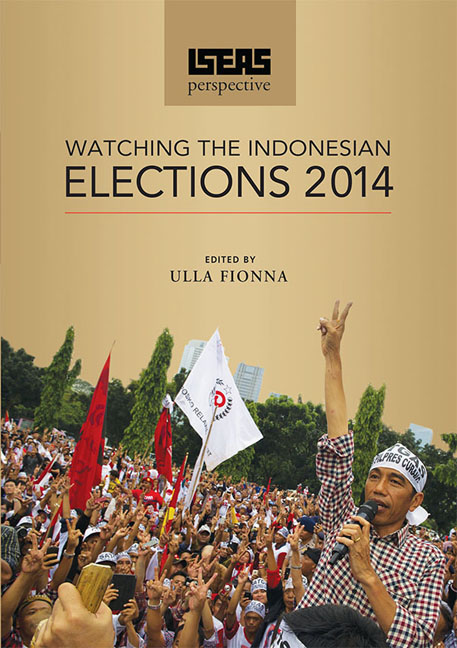Book contents
- Frontmatter
- Contents
- Foreword
- Introduction
- 1 The Gubernatorial Race in Jakarta: Background and Implications
- 2 Indonesian Parties Struggle for Electability
- 3 Who Will Be Indonesian President in 2014?
- 4 Indonesian Presidential Election Forcing Rejuvenation of Parties
- 5 Resisting Democracy: Front Pembela Islam and Indonesia's 2014 Elections
- 6 Getting to Know the Contestants of the 2014 Indonesian Parliamentary Elections
- 7 A Snapshot of the Campaigning in Indonesia's 2014 Legislative Elections
- 8 Unpacking the Results of the 2014 Indonesian Legislative Elections
- 9 Indonesia's 2014 Legislative Elections: The Dilemmas of “Elektabilitas” Politics
- 10 The Islamic Factor in the 2014 Indonesian Elections
- 11 Vote-buying in Indonesia's 2014 Elections: The Other Side of the Coin
- 12 Gap Narrows Between Candidates in Indonesian Presidential Elections
- 13 Analysing the Economic Platforms in the Indonesian Presidential Election
- 14 Indonesian Islamic Parties After the 2014 Elections: Divided and Self-Centred
- 15 Safeguarding Indonesia's Pluralism: An Essential Task for Joko Widodo
- 16 Jokowi's Key Economic Challenge: Improving Fiscal Policy for Equitable Growth
- 17 Crossing the River While Avoiding the Stones: Jokowi's Run-up to the Presidency
- 18 Post-elections Indonesia: Towards a Crisis of Government?
- Epilogue: Jokowi's First Months: Compromise Cabinet, Subsidy Cuts, and Corrupt Coalition
17 - Crossing the River While Avoiding the Stones: Jokowi's Run-up to the Presidency
Published online by Cambridge University Press: 29 July 2017
- Frontmatter
- Contents
- Foreword
- Introduction
- 1 The Gubernatorial Race in Jakarta: Background and Implications
- 2 Indonesian Parties Struggle for Electability
- 3 Who Will Be Indonesian President in 2014?
- 4 Indonesian Presidential Election Forcing Rejuvenation of Parties
- 5 Resisting Democracy: Front Pembela Islam and Indonesia's 2014 Elections
- 6 Getting to Know the Contestants of the 2014 Indonesian Parliamentary Elections
- 7 A Snapshot of the Campaigning in Indonesia's 2014 Legislative Elections
- 8 Unpacking the Results of the 2014 Indonesian Legislative Elections
- 9 Indonesia's 2014 Legislative Elections: The Dilemmas of “Elektabilitas” Politics
- 10 The Islamic Factor in the 2014 Indonesian Elections
- 11 Vote-buying in Indonesia's 2014 Elections: The Other Side of the Coin
- 12 Gap Narrows Between Candidates in Indonesian Presidential Elections
- 13 Analysing the Economic Platforms in the Indonesian Presidential Election
- 14 Indonesian Islamic Parties After the 2014 Elections: Divided and Self-Centred
- 15 Safeguarding Indonesia's Pluralism: An Essential Task for Joko Widodo
- 16 Jokowi's Key Economic Challenge: Improving Fiscal Policy for Equitable Growth
- 17 Crossing the River While Avoiding the Stones: Jokowi's Run-up to the Presidency
- 18 Post-elections Indonesia: Towards a Crisis of Government?
- Epilogue: Jokowi's First Months: Compromise Cabinet, Subsidy Cuts, and Corrupt Coalition
Summary
INTRODUCTION
Karl Marx famously said that men make their own history, but not under circumstances that they choose. Rather, they must act within existing circumstances that are “transmitted from the past”. Joko Widodo (Jokowi) represents a new breed of Indonesian politicians, and is in fact a creation arising from the newly decentralized polity of the post- Suharto period. Despite this new situation, Jokowi must act within a complex political and institutional context. And, in the coming few weeks before he assumes office, several of the institutional junctures that Indonesia will traverse are not within his control. The sum of these events will largely determine the effectiveness of his administration.
THE ROAD TO THE PRESIDENCY
In July 2014, Joko Widodo faced off against Prabowo Subianto in the Indonesian presidential election. Touted as the most polarizing presidential election that the country has ever seen, the close and fiercely contested race pitted a member of the country's old political elite against someone new and fresh, but with solid administrative credentials. Jokowi started as a small business owner from the town of Solo (Central Java), and went on to become Mayor of that city and then Governor of Jakarta. Prabowo, in contrast, comes from a line of technocrats and had a successful career in the military before turning to politics. After an intense campaign and election, the General Election Commission announced that Jokowi had won 53.15 per cent of votes against Prabowo's 46.85 per cent on 22 July.
Alleging vote-rigging and fraud, the Prabowo camp decided to contest the elections before the Constitutional Court. In August, following a short and succinct review of the plaintiff's complaints however, the Court rejected his requests to cancel Jokowi's victory and conduct a re-vote. While Prabowo has yet to officially concede defeat, influential members of his coalition — including Hashim Djojohadikusumo, his brother, and Hatta Rajasa, his vice-presidential candidate and leader of PAN — have acknowledged Jokowi's victory.
Jokowi's presidency will mark the first time since Indonesia's independence that a locally elected politician assumes national office. However, despite his personal popularity, political capital, and goodwill, Jokowi will have to manoeuvre a number of key tests that will determine the course and impact of his office.
THE TRANSITION
While Jokowi may be riding a wave of considerable momentum, he will need to use his political capital wisely.
- Type
- Chapter
- Information
- ISEAS PerspectiveWatching the Indonesian Elections 2014, pp. 158 - 165Publisher: ISEAS–Yusof Ishak InstitutePrint publication year: 2015

